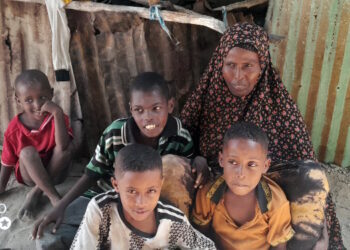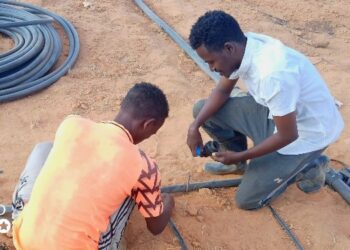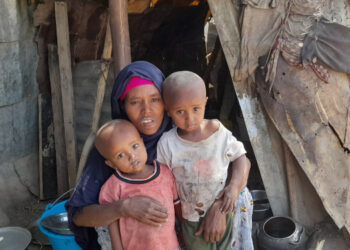(ERGO) – A fire that swept through Hagadera market in Dadaab’s refugee complex in north-eastern Kenya on 27 October has erased hundreds of small businesses and put refugee traders’ families out of income.
The market traders’ committee secretary, Diriye Bashir Abdi, estimated that 400 traders lost their source of livelihood, with a total of $1.8 million worth of losses in terms of property and assets in the market that was crowded with small stalls.
“When the fire intensified, nothing could be saved. Daily labourers have lost their jobs. The shops supplied cheap goods to poor local families. Stockpiles were burnt. Company offices were destroyed. Many essential services have collapsed,” he told Radio Ergo.
He said the fire started in the morning when it was very hot and as there is no fire brigade in the camp, people tried to put it out, but were overcome by the flames that spread rapidly.
Food shops, bakeries, wholesale clothing outlets, remittance shops, telecom booths, and restaurants are all in ashes.
Fadumo Abdi Mohamed, whose clothing shop was among those burnt, said she and her five children had lived off the profit from her business for the five years since the loss of her husband.
“I used to cook three meals a day – now we are down to one,” she told Radio Ergo. “Everything we depended on burned down. I have no job, nothing coming in from anywhere. We are in a very difficult situation.”
She was making 500 to 800 Kenya shillings a day that was enough to pay living expenses, school fees, and reinvest in her business. She had no savings, and no insurance. Even her debt record books were lost so she can no longer track the customers owing her money.
“When I think of going back to the market, there is nothing to start with,” she said. “Everything I had is gone. I am so discouraged. I cannot even remember all the losses. I carried nothing out of it except my life.”
She used to pay 5,000 shillings per month for Koranic and private school education for her children but can’t raise the money now and is pleading with teachers for more time.
Her family had gone through great hardship before arriving in Dadaab in 2019, having fled from Kismayo in southern Somalia, where her husband was killed.
Ibado Ali Ibrahim lost two shops selling food and clothing, three baking ovens, and a small restaurant. Her family of 20 had depended entirely on these businesses for survival.
“Our children now sleep hungry. All we have is water to drink. I have nothing – no oil, no flour, no sugar. I survive on God’s mercy,” she said.
She bought a carton of milk and half a kilo of sugar the night before speaking to Radio Ergo’s local reporters, rationing it carefully among her younger children.
Ibado says this is the sixth time her business has been destroyed by fire, but the scale of this loss is far greater than before. She had no chance to salvage any stock or tools.
Previous fires were smaller and she was able to get help from large traders, but this time even the wholesale suppliers were wiped out.
“More than two million five hundred thousand shillings worth of goods were lost. Nothing is left – not even a pen or a debt book. I am confused. I don’t know who owed me or who I owed. I am relying on God now,” Ibado said, stunned by her situation.
“I didn’t know the fire had started nor how fast it was spreading. I am still in shock. I haven’t slept properly since then.”
Ibado arrived in Dadaab 33 years ago as a young woman and slowly expanded her business over 25 years from a small stall to one of the larger shops serving the camp.
She had 15 casual workers who depended on her businesses who can no longer earn any income either.
On the day of the fire, she had just restocked her shops and placed goods safely indoors to protect them from possible rain. She had even surrounded her shop with sacks of sand to manage water leaks, never imagining that fire would be the threat.
Nine large fires have hit Hagadera market over the years, repeatedly destroying the hard-earned income of refugee families with no alternatives.
Market secretary, Diriye Bashir Abdi, added that although discussions had been held in the past on how to prevent fires, no effective solution had been put in place. The market structures were made mostly of iron sheets, wooden poles, and cloth that were devoured by the flames.
The camp economy was already at a low ebb due to aid cuts and general reduction in jobs and services.










